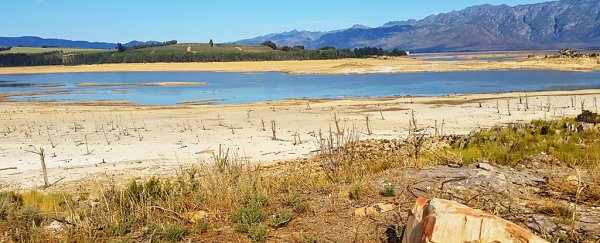Cape Town has postponed the date on which it would run out of water - again.
After three years of persistent drought, the government has warned that the coastal city would be forced to turn off most of its taps in 2018 - a date also known as "Day Zero".
The new Day Zero is now 9 July 2018, the government's official Day Zero tracker said on Tuesday.
The date was previously set at June 4, so the latest update has postponed it by 35 days.
For the past several months, Cape Town citizens have been told to drastically cut their water consumption, a tactic which the city says is starting to work.
Officials were able to push back the day after organising a large transfer of water from elsewhere in the country to their dam systems, Cape Town's executive deputy mayor Alderman Ian Neilson said in a statement to Business Insider.
However, Neilson also warned that Day Zero could also be moved back to June if the city fails to reduce its weekly water usage by 73 million litres, from the current 523 million litres to 450 million litres, by the time the water transfer ends. He did not specify when that would take place.
The city originally set Day Zero at April 21, before moving it forward to April 12, backward to May 11, and back again to June 4.
Should the day come, most of the city's taps will be turned off, and around 20,000 residents would have to queue for water and be subjected to a strict water-rationing system.
Neilson said: "I urge the residents of Cape Town not to ease up on their water-saving efforts. We cannot afford to slow down when the estimated Day Zero date moves out, simply because we cannot accurately predict the volume of rainfall still to come or when it will come."
Cape Town's government has been calling on citizens to limit their water usage to 50 litres per day. A five-minute shower uses around 45 litres.
To meet the challenge, residents have been storing water in jugs and collecting free water from local breweries.
Officials have also recommended that people collect and reuse their bathing water for their toilets, limit showers to two minutes, and wash their hands with hand sanitiser instead of water.
The government is worried that if people can't conserve enough water to avoid the shutoff, there will be anarchy in the city, which is home to four million people.
Helen Zille, the premier of the Western Cape province, said earlier this year that the challenge faced by the city "exceeds anything a major city has had to face anywhere in the world since the Second World War or 9/11".
This article was originally published by Business Insider.
More from Business Insider:
